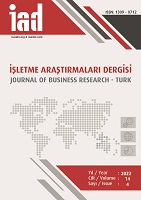Üniversitelerdeki Akademisyenlerin Kayırmacılık Algılarının Örgütsel Bağlılığa Etkisinde İş Doyumunun Aracılık Rolü: Ankara İli Örneği
The Intermediate Role of Job Satisfaction in the Effect of Preference Perceptions of Academic at Universities on Organizational Commitment: The Case of Ankara
Author(s): Yeliz Cankurtaran, Dilaver TengilimoğluSubject(s): State/Government and Education, Human Resources in Economy, Business Ethics, Socio-Economic Research, Sociology of Education
Published by: Orhan Sağçolak
Keywords: Nepotism; Organizational Commitment; Job satisfaction; Academician;
Summary/Abstract: Purpose – For organizations to gain their aim and increase their performance, they need a manpower borderline high commitment and job satisfaction. Nepotism is an unethical phenomenon that prevents institutions from reaching their goals and jeopardizes their existence.Nepotistic behaviors harm the organizational commitment and job satisfaction of academicians. This research was carried out to fix whether the understanding of favoritism, organizational commitment and job satisfaction levels of academics to strive in foundation and status universities in Ankara different according to demographic parameter. Design/method/approach – In this working, descriptive relational (correlational) survey model, which is one of the quantitative research methods, was used. In this research, which belongs to the academicians working in Ankara Public and Private Universities, academics were identified by Stratified Random Sampling method based on the ownership of the universities, and 518 (323 online, 195 face-to-face) questionnaires were included in the evaluation. In addition to the socio-demographic characteristics of the academics involved in the research, the 'Nepotism Scale', the 'Organizational Commitment Scale' and the 'Minnesota Job Satisfaction Scale' were evaluated. The obtained data were analyzed through statistical package programs and the results were interpreted. Confirmatory factor analysis, t test, Tukey and Anova tests, descriptive statistical methods (frequency, percentage, mean and standard deviation) and correlation analysis were performed. Results – After all the research, it was determined that academicians' perceptions of favoritism (Mean=2.67) were low, and their organizational commitment (M=3.05) and job satisfaction (M=3.69) were moderate. Looking at the findings of the study, a statistically important distinction was observed in the perceptions of favoritism according to the variables of age, university status, all working time, being a manager, and all working time in the profession. In addition, it has beendetermined that there is an effective distinction between academicians' age, monthly income, university status, total working time, working time at the current university, being a manager, all working time in the profession and job satisfaction. In addition, a statistically significant distinction was observed in the levels of organizational commitment according to the status of being a manager and working time at the current university. However, the fates of the correlation analysis to indicated that there is a negative relationship between academicians' perceptions of favoritism, organizational commitment and job satisfaction. Discussion – More studies are requiremented to develop more plans on what institutional effects and results may reveal nepotism, organizational commitment, and job satisfaction. These studies should be expanded in the national and international arena.
Journal: İşletme Araştırmaları Dergisi
- Issue Year: 14/2022
- Issue No: 4
- Page Range: 3193-3208
- Page Count: 16
- Language: Turkish

